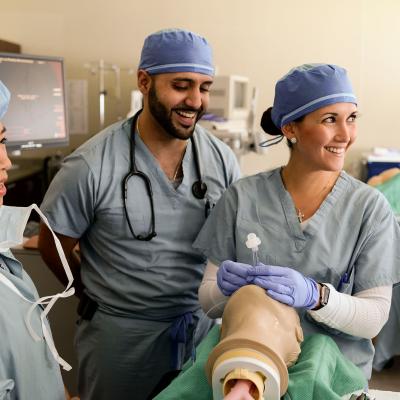- AdventHealth University

Raise your hand if you’ve ever made –and broken– a New Year’s resolution. Every year, around 40 percent of the US population makes at least one New Year’s Resolution1. Among people who make resolutions, less than 10 percent succeed in keeping them2.
Rethinking the types of resolutions, you make and how you make them can be the secret to sticking to them. Instead of making broad, sweeping statements such as “I’m going to improve my life,” or “This is the year I’ll get ‘healthy,'” focus on smaller, specific goals. A resolution that has a plan attached to it is a resolution you’re more likely to keep. Here are a few ideas to get you started.
1. Learn more about the world around you
What’s going on with Brexit? Why are people protesting in Paris? What’s the plight of the Rohingya people in Myanmar? If you don’t know the answers to these questions, it can be worth setting a resolution to learn more about the world around you.
You can do that by committing to reading at least one news article from the “International” or “World News” section of your local paper or your preferred online news source each day. The world around you is increasingly globalized and interconnected. Understanding what’s happening in the lives of people in other countries can help you to build up empathy for others. It can also give you a better understanding of and appreciation for the things you have in your life.
2. Schedule your preventative care appointments for the year
Whether it’s to lose weight, quit smoking, or exercise more, health-related New Year’s resolutions tend to be among the most popular. Here’s one that you can make and keep easily: During the first month of 2019, make a point to call your primary care physician, your dentist, and other medical providers and schedule appointments for a check-up, exam, cleaning, or other preventative care screenings. Set aside an hour or so one day to call your medical providers or to book appointments online.
Scheduling your (and your family’s) health screenings and exams for the year ahead ASAP means you have the opportunity to catch and treat any issues before they become more challenging to manage. It also gives you peace of mind that you and your loved ones are doing OK physically.
Thanks to the Affordable Care Act, preventative care services3 are available to you and your family through your insurance company without a copay or co-insurance.
3. Cut down on waste
Every year, people in the US produce around 258 million tons of trash4. More than half of that waste ends up being incinerated or tossed into landfills. While you don’t have to aim for a”zero-waste life,” and you don’t have to try to be like one of those bloggers who can fit all their trash for the year into a mason jar, you can take small steps to reduce the amount of waste you and your family produce.
A few simple things you can do to reduce waste in 2019 include:
- Start composting. Vegetable and fruit scraps, as well as garden and lawn trimmings, can be composted. Your municipality might collect these items for composting, or you might be able to find a private company to receive them. If you have space, you can try composting at home.
- Purchase items that aren’t overly packaged. Skip buying fresh fruits and vegetables that are wrapped in plastic or sold in plastic bags. Look for food items that are covered in cardboard or other renewable packaging materials, rather than plastic.
- Only buy what you know you’ll use. Resist the temptation to purchase something just because it’s on sale.
- Get creative with what’s in your pantry and refrigerator. Reduce the amount of food that gets thrown out by trying out new recipes or by doing a “pantry challenge,” during which you find ways to use up the food you already have.
- Bring a cloth bag to the supermarket or other stores. If you drive, keep a collection of bags in your back seat or trunk so that you always have them with you.
4. Reconnect with friends and family
Has it been a while since you spoke with your roommate from college? What about your great aunt who lives three states away? Has your primary way of communicating with friends been by “liking” their Facebook or Instagram posts?
This year resolve to reconnect with out-of-touch loved ones. Make a list of people you’d like to connect with and then send an email or text or call them up. Once you’ve made the initial contact, you can schedule a time to meet in person if they live nearby or set up regular video calls or phone chats to make it easier to keep in touch.
5. Find a way to get involved in your community
If you’ve felt disconnected from your local community, make 2019 the year you find a way to get involved. Choose a date during January to set aside time to make a plan for volunteering or another type of community involvement.
On that date, brainstorm that type of issues that you care about (such as improving literacy in your area, feeding the hungry, or helping youth). Then, look up organizations near you that work with those issues and find out what their needs are. One organization might need people to volunteer as literacy tutors, and another might require people to help serve meals or sort canned goods for a food bank. Get in touch with an organization whose needs and mission line up with your goals and learn more about how to schedule volunteer shifts and what you need to do to get started as a volunteer. If you don’t have the time in your schedule to volunteer, find out what you can contribute (such as money, food, or school supplies), to help an organization you believe in.
Whatever resolution you end up making for the New Year, AHU Online’s academic advisors, tutors, and counselors want to see you succeed with it. We are here to provide you with support and assistance, 24 hours a day, seven days a week. If one of your resolutions is to go back to school to advance your healthcare career, AHU Online is here to help. Contact us today to find out more about our flexible online programs.
Sources:
1. “The science of keeping your New Year’s resolution,” Washington Post, published online January 1, 2018, https://www.washingtonpost.com/news/wonk/wp/2018/01/01/the-science-of-keeping-your-new-years-resolution/.
2. “The secret to not breaking your New Year’s resolution,” USA Today, published online December 27, 2014, https://www.usatoday.com/story/money/columnist/2017/12/28/secret-not-breaking-your-new-years-resolution/967355001/.
3. “Preventive care benefits for adults,” Healthcare.gov, accessed December 10, 2018, https://www.healthcare.gov/preventive-care-adults/.
4. “Together, we can make a difference!,” Environmental Protection Agency, accessed December 10, 2018, https://www.epa.gov/sites/production/files/2016-11/documents/advncng_smm_infogrphc-2014-sm.pdf


